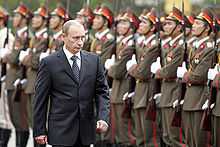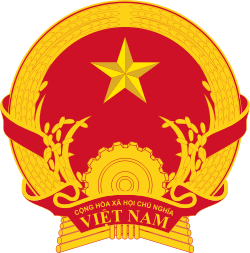Russia–Vietnam relations
 |
|
Russia |
Vietnam |
|---|---|
Russia–Vietnam relations (Russian: Российско-вьетнамские отношения, Vietnamese: Các mối quan hệ Nga-Việt) date back formally to 30 January 1950, when the Union of Soviet Socialist Republics established an embassy to North Vietnam.[1] Russia is the principal ally of the Socialist Republic of Vietnam.
History

The USSR was traditionally one of Vietnam's strongest allies. After the dissolution of the Soviet Union in 1991, friendly relations were established between Vietnam and the Russian Federation, the USSR's main successor state. Nearly 5% of the official count of the Vietnamese population in Russia is composed of students with Russian government scholarships.[2] In January 2001, to commemorate the 50th anniversary of Soviet-Vietnam ties, Russian president Vladimir Putin made an official visit to Hanoi, where he was received by Vietnamese president Trần Đức Lương.[1] Bilateral trade amounted to $550 million in 2001; Russian exports to Vietnam included machinery and steel, while Vietnam sold textiles and rice. The two countries also maintained relations in the energy sector, with joint venture Vietsovpetro pumping crude oil from the Bạch Hổ oil field.[3]
After the Vietnam War ended in 1975, the Soviet Union became Vietnam's main benefactor during the 1980s until the country collapsed in 1991, leaving Vietnam without its ideological, economic and military ally. In rhetoric, Vietnam officially remains one of the world's last socialist countries – the communist hammer-and-sickle flag can still be seen – but it has embraced a market economy along with Asian and Western investment over the past two decades.
Sergey Lavrov, Foreign Minister of Russia, visited Vietnam in July 2009. "Relations between the two countries have developed positively," Lavrov said. "We are convinced that the bilateral cooperation will be at the highest level."[4]
Military cooperation
The military cooperation between Russia and Vietnam had fallen off since the dissolution of the Soviet Union.[3] The Soviet and Russian Navy had until 2002[5] maintained a presence in Vietnam at the US-built military base in Cam Ranh Bay which had been turned over to the Republic of Vietnam Navy and captured by North Vietnamese forces in 1975. By 1987, the Soviets expanded the base to four times its original size. The Soviet Union and Vietnam officially denied the base's existence.[6] In 1988, the Soviet Foreign minister Eduard Shevardnadze discussed the option of withdrawal from Cam Ranh Bay, and the reduction in forces was effected by 1990.[7][8]
An increasingly more assertive People's Republic of China in its claims to the Spratly Islands dispute has prompted Vietnam to gradually deepen its strategic relationship with India, another long-standing USSR and Russian partner and ally, and Russia itself,[9] with the Russian government recently signing several military contracts with Vietnam involving the sale of six Varshavyanka-class submarines[10] and twelve new Sukhoi Su-30MK2 multirole fighter aircraft.[11] In addition, Russian Prime Minister Dmitry Medvedev approved of a draft Russian-Vietnamese military cooperation pact towards the end of August 2013 formalizing the two nations' defense cooperation.[12]
In November 2014, against the backdrop of intensified diplomatic confrontation between Russia and the West referred to by some as Cold War II, an agreement was signed by Russia and Vietnam that significantly simplified the use of the Cam Ranh Base by the Russian Navy. In March 2015, this move as well as Russia's intensified air force activities in the region that relied on the use of the base to refuel its nuclear-capable strategic bombers TU-95, engaged in "provocative" flights, including around Guam, home to a major US air and naval installation, caused the US military command to publicly voice concern and acknowledge its diplomatic intervention regarding the issue.[13]
Bilateral trade and investment
Energy
Energy-hungry Vietnam in 2008 approved the use of atomic power for civilian purposes, and Russia has already said it would like to take part in the planned programme. Khiem said the two sides also reaffirmed their traditional relations in other fields, including defence. That report came after the Russian newspaper Kommersant said Vietnam was also about to sign a deal for six Russian submarines.[14] along with the Gepard class frigate and a joint production in anti ship missiles as military ties are growing again.
Vietnam's President Triet, on a visit to Moscow on October 2008, signed a pact for Vietnamese and Russian firms to develop energy fields off the Vietnam coast. In the telecommunications sector, Russia's VimpelCom on mid-July 2009 announced the commercial launch in Vietnam of its Beeline mobile service through GTEL-Mobile, a joint venture with a Vietnamese state-owned company. Lavrov was to travel Sunday July 26 to southern Ho Chi Minh City to meet local government officials there.[15]
In the late 2000s, Russian influence in Vietnam has begun to grow again but remains far below that of Soviet times. On Saturday July 25, Vietnam and Russia signed a memorandum of understanding between their respective atomic energy agencies but no details were released. "Cooperation on atomic energy will be a priority", Lavrov said.[16]
Other
Preliminary Vietnamese government data show that exports to Russia totalled almost 139 million dollars in the first five months of 2009 while imports were valued at about 525 million dollars. Vietnam's former wartime enemy, the United States, which normalised diplomatic ties in 1995, received Vietnamese exports worth more than four billion dollars in the first five months, the data showed. Imports exceeded 932 million dollars.[17] By 2012 trade between the two nations has reached $3.5 billion
In March 2013, Eurasian Economic Community minister of trade Andrey Slepnev visited Hanoi to open talks on the possibility of Vietnam joining the Customs Union of Belarus, Kazakhstan and Russia.[18][19]
Diplomatic missions
|
|
References
- ↑ 1.0 1.1 "Vietnam-Russia traditional ties reach new heights". Embassy of Vietnam in the United States of America. 2001-03-05. Retrieved 2007-08-08.
- ↑ "Russian FM stresses traditional relations with Vietnam". Ministry of Foreign Affairs, Vietnam. 2006-01-25. Retrieved 2007-08-08.
- ↑ 3.0 3.1 Blagov, Sergei (2002-07-12). "Russia committed to Vietnamese oil". Asia Times. Retrieved 2008-01-04.
- ↑ Minister of Foreign Affairs of the Russian Federation, S. Lavrov visits Vietnam, ISRIA
- ↑ Arthurs, Clare (2002-03-26). "Russia to stress Vietnam ties". BBC News. Retrieved 2008-01-04.
- ↑ Trainor, Bernard E. (1987-03-01). "Russians in Vietnam: U.S. sees a threat". The New York Times. Retrieved 2007-01-04.
- ↑ Mydans, Seth (1988-12-23). "Soviets Hint at Leaving Cam Ranh Bay". The New York Times. Retrieved 2008-01-04.
- ↑ Weisman, Steven R. (1990-06-04). "Japanese-U.S. Relations Undergoing a Redesign". The New York Times. Retrieved 2008-01-04.
- ↑ Russia’s Growing Ties with Vietnam The Diplomat
- ↑ Russia to Deliver First Kilo Class Sub to Vietnam in 2013 RIA Novosti
- ↑ Vietnam signs deal with Russia to procure additional Su-30MK2s
- ↑ Medvedev okays draft Russia-Vietnam military cooperation pact
- ↑ "U.S. asks Vietnam to stop helping Russian bomber flights". Reuters. 2015-03-11. Retrieved 2015-04-12.
- ↑ Russian FM to visits Vietnam
- ↑ Russian FM to visits Vietnam
- ↑ Lavrov begins visit for ASEAN Regional Forum
- ↑ Russia, Vietnam talk 60th anniversary celebrations
- ↑ Federov, Gleb (2013-03-28). "Vietnam may join the Customs Union". Russia Beyond The Headlines. Retrieved 2013-03-28.
- ↑ "Free trade zone with Vietnam: mutual benefits". Russia Beyond The Headlines. 2013-03-28. Retrieved 2013-03-28.
External links
| Wikimedia Commons has media related to Russia–Vietnam relations. |
- (Russian) Documents on the Russia–Vietnam relationship at the Russian Ministry of Foreign Affairs
- (English) Documents on the Russia–Vietnam relationship at the Vietnamese Ministry of Foreign Affairs
- (Vietnamese) Documents on the Russia–Vietnam relationship at the Vietnamese Ministry of Foreign Affairs
- (English) Vietnam visa from Russia
Diplomatic missions
- (Russian) (Vietnamese) Embassy of Russia in Hanoi
- Embassy of Vietnam in Moscow
- (Russian) Consulate General of Russia in Danang
- (English) (Vietnamese) Consulate-General of Vietnam in Vladivostok
| |||||||||||||||||||||||||||||


